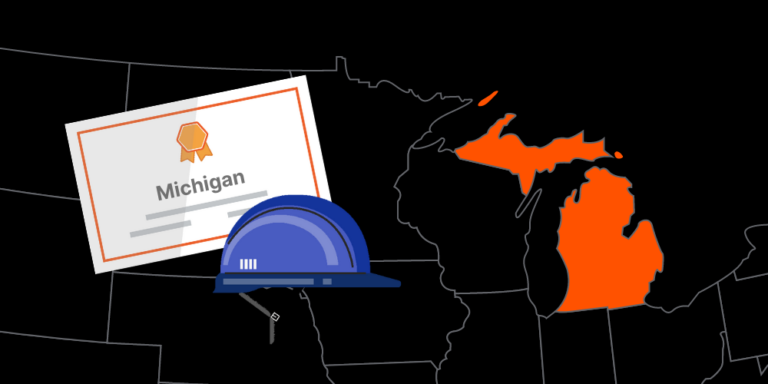— 5 min read
Michigan Contractor Licensing Guide
Last Updated Jan 30, 2025
Last Updated Jan 30, 2025

If you're starting a new construction business or looking to run one in Michigan for the first time, Michigan’s licensing requirements are pretty stringent: Just about every contractor working within the state needs to carry a license or registration of some sort. In fact, it’s easier to explain who doesn’t need a license than who does.
General contracting businesses working on projects valued at less than $600 do not require a license. Just about everyone else needs to carry one, and we’ll go further into that in a bit.
Also, all Michigan businesses have to register with the state’s Department of Treasury. You’ll receive the necessary tax license and permits to work within the state. If you’re operating as a DBA (Doing Business As), you’ll have to register with the Department of Licensing and Regulatory Affairs (LARA).
Keep reading for all the details you need to get a contractor license in Michigan.
Table of contents
How to get a Michigan contractor licenses
Michigan has different requirements for licenses depending on the specific license you need. See below for information about general contractor licenses, mechanical contractor licenses, plumbing contractor licenses, and electrical contractor licenses.
General contractor license
General contractors working on projects valued in excess of $600 must carry either a residential builders license or a maintenance and alterations contractor license. Both of these licenses are available through the state’s Department of Licensing and Regulatory Affairs.
Both licenses require a 60-hour prelicensure course before you’re allowed to take the examination. So essentially, you have to apply and take a course before applying to take a test for a license.
The general requirements for both of these exams are:
- Must be 18 or older
- Must hold a Michigan driver’s license
- Complete the 60-hour course
- Pass the residential contractor or maintenance and alteration contractor test
- Pay licensing fees ($195 license fee, $185 annual renewal)
Electrical contractor license
Contractors need to be aware of two types of electrical licenses when starting an electrical contracting business in Michigan: the Master Electrician License and the Electrical Contractor License. Both are matters of the Department of Licensing and Regulatory Affairs.
To become an electrical contractor in Michigan, either you or someone in your employ full-time must hold a Master Electrician License. This person must be 22 years of age and hold a journeyman’s license for at least two years. They must also have 12,000 hours of experience obtained over a period of not less than six years. They can then apply to take the examination.
Once you or an employee of yours hold a Master Electrician License, you may apply for an Electrical Contractor License. This license also requires you to pass an examination.
How to get a Michigan state plumbing license
Similar to an electrical license, there are two types of plumbing licenses that Michigan plumbing contractors may hold: Master Plumber and Plumbing Contractor License. Both fall under the Department of Licensing and Regulatory Affairs.
To become a plumbing contractor in Michigan, you or someone you employ full-time must hold a Master Plumber’s license. This person must be 18 years old and have 4,000 hours of experience working as a journeyman plumber over a period of not less than two years immediately preceding the application date. They also must pay the application fee and take the exam.
Once you have a licensed master plumber under you, you’re able to apply for a plumbing contractor license. In addition to the master plumber license, the person applying must be an owner of a sole proprietorship or partnership, or be the officer of a corporation or LLC. They must pay the exam fee and pass the exam as well.
Mechanical contractor license
Mechanical contractors must also carry a state-issued license in Michigan.
Requirements are relatively straightforward. An applicant must have a minimum of three years experience in one of the work classifications applied for below:
- Hydronic heating and cooling and process piping
- HVAC equipment
- Ductwork
- Refrigeration
- Limited heating service
- Unlimited heating service
- Limited refrigeration and air conditioning service
- Unlimited refrigeration and air conditioning service
- Fire Suppression
- Solar Heating and Cooling
- Solid Fuel and Vented Decorative Gas Appliances
- LP Distribution Piping
- Fuel Gas Piping and Venting
These contractors will have to apply for an exam, pass it, and pay the required fees.
Stay updated on what’s happening in construction.
Subscribe to Blueprint, Procore’s free construction newsletter, to get content from industry experts delivered straight to your inbox.

Michigan contractor licenses by city
Commercial general contractors, as well as some trades, will have to check with local jurisdictions for licensing requirements.
Detroit
Detroit doesn’t have any specific requirements for general contractors and plumbers outside of the state’s statutes. However, electrical contractors do have some special requirements.
Electrical contractors have to apply for an additional license and take an additional exam to operate within Detroit city limits. They will also need to pay an additional licensing fee.
Additionally, the following trades need to apply for and pass an examination in Detroit:
- Awning Erector
- Sign Erector
- Welder
- Wrecking and Demolition
Grand Rapids
Licensing in Grand Rapids, Michigan, is fairly straightforward, as it leaves most of the contracting license requirements up to the state. However, there are state license registration requirements for certain contractors, including:
Warren
Contractors in Warren have very few city-ordered requirements to follow. While the city overwhelmingly recognizes state-issued licenses, there are licenses for building wreckers and cement contractors. Otherwise, contractors need to register the same as other businesses.
Sterling Heights
All businesses operating within the city of Sterling Heights have to register with the City Clerk. There are no other requirements for contractors.
Ann Arbor
Ann Arbor does not have any specific licensing requirements pertaining to contractors at this time.
Penalties for unlicensed contracting in Michigan
On top of forfeiting your lien rights on residential projects, the penalties for unlicensed contracting in Michigan are steep.
The first offense is punishable by a fine of $5,000 and $25,000, one year in jail, or both. Subsequent violations extend the jail time to up to two years.
Michigan’s licensing and mechanics lien laws are strict. If you’re working on a residential project in a capacity that legally requires a license, you won’t have rights to a mechanics lien if the customer doesn’t pay. While you should always strive to follow state laws and regulations, it becomes even more important when your payments are at risk. If your trade requires a license, you better carry one.
Was this article helpful?
Thank you for your submission.
71%
29%
You voted that this article was . Was this a mistake? If so, change your vote here.
Scroll less, learn more about construction.
Subscribe to The Blueprint, Procore’s construction newsletter, to get content from industry experts delivered straight to your inbox.
By clicking this button, you agree to our Privacy Notice and Terms of Service.
Categories:
Tags:
Written by
Tom Scalisi
57 articles
Tom Scalisi is a writer with over 15 years of experience in the trades. He is passionate about educating contractors and specialty contractors about the best practices in the industry. He has seen first-hand how education, communication, and preparation help construction professionals overcome challenges to build a strong career and thriving business in the industry.
View profileExplore more helpful resources

Contractor License Bonds: Everything You Need to Know
In order to perform construction work, many states require contractors to be “licensed and bonded.” What does that mean? Well, every state sets its own rules for contractor licensing, and...

Contractor’s Guide to License Reciprocity: Working Across State Lines
For many contractors, growing a construction business means taking on jobs in different states. Whether it’s to take a one-off project or to establish a new business location, working in...

Vermont Contractor License: Guide to Rules & Requirements
If you’re starting a construction business in Vermont or looking to expand your business from another state, being properly licensed to work is one of the first key steps. There...

The Maine Contractor License: Guide to Rules & Requirements
If you’re considering starting a contracting business in Maine, it’s important to know the rules and requirements for proper licensing. Maine takes a different approach to contractor licensing than most...